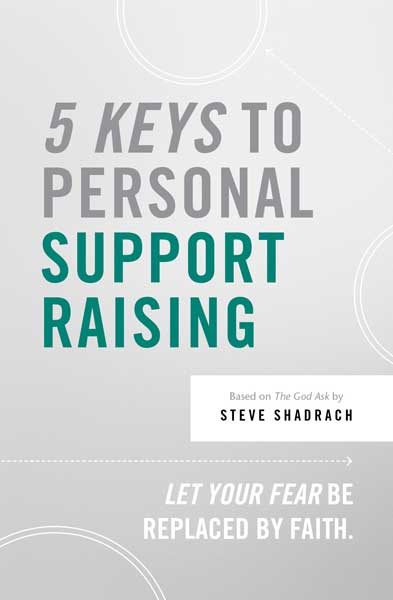
Dread. That’s what I felt before my weekly check-in as an MPD coach with this staff. The litany of excuses, hopelessness, and futility I felt each meeting sucked me right into their vortex of despair, transforming a great day into a dreary one. I worked hard as a coach, asking reflective questions designed to help them arrive at a new insight or behavior change that would move them to some measure of success. Nearly every time my questions were answered with some form of “I have tried it all and people just don’t want to support me. I don’t even know anyone who’s fully supported and I just don’t think this support raising stuff works.” MPD is hard and people can get discouraged by their unfruitful efforts, especially if they are from communities that have significant challenges in sending Great Commission workers. The question is: what can we do to assist them in this process?
I can tell you what doesn’t work: becoming frustrated, judgemental, and exasperated. It can be easy to judge the work ethic, commitment, and motivation of these staff because we have seen success in our own MPD or the MPD of others who applied the training and techniques. We may then look at these people and conclude what they too have concluded: that support raising for them is impossible. In some cases, lack of effort and motivation may be the issue, but today I want to talk about a different kind of issue that warrants compassion and empathy. What we may need to do is focus less on their behavior and more on the way their brains have been programmed. Unfortunately, until the way they think changes, it will be nearly impossible for them to see that any effort they provide will result in a different outcome.
This is what is called learned helplessness. Imagine that…
we find ourselves in a situation where we are continuously affected negatively, and we have absolutely no control over the things that are affecting us. Cloud, Henry. Boundaries for Leaders: Results, Relationships, and Being Ridiculously in Charge. HarperCollins. Kindle Edition.
For people who find themselves in families, socioeconomic groups, or ethnic groups where their ability to change their personal quality of life seems or is beyond their scope of influence, this becomes a chronic ongoing problem that negatively changes the brain. As Cloud continues, the result is more than a momentary feeling of “life sucks” but rather a fundamental change in which the brain says “do nothing” and “it won’t make any difference” since you have no control over what’s making you miserable.
For anyone who has experienced this fundamental reprogramming of their brain, MPD feels impossible. Cloud says creative thinking, initiation, and problem-solving all stop, and without intervention, the lack of these functions will become more pronounced over time. But there is good news. Our brains can be reprogrammed—or, as we say in the Christian world, renewed by the transforming of our minds. For someone who struggles with learned helplessness, the first step is limiting their negative thinking. Here is an exercise you can do with a person who is struggling with learned helplessness.
They feel they have no ability to influence outcomes in their life, so the first step is to identify those things which they actually have no control over. Stop right now and have them grab a piece of paper (or if they prefer digital, type away and miss out on the beautiful sensory experience of writing) and list out all of the things that they have no control over that are making MPD difficult such as COVID-19, an unsupportive church, a poor community, a community unfamiliar with missions, a misunderstanding of tithing, and other people’s responses. Write it all out. Then pause. This list is very real and it very much affects their life right now. That is reality right there. Let them have five minutes to sink into all the worry they can hold over that list. Well done. That list is not their responsibility. We’re not trying to talk them out of reality, but rather to release control of things they cannot control. These are the things that they can pray for and limit the time they spend thinking about. They can’t change anything on that list, but they can hand it all over to God and let Him worry about it. These things have nothing to say about their value or competence. They also don’t have anything to contribute to the validity of training or MPD.
Next, have them start a new list of everything that they do have control over that can create positive results. This is their priority list and should be the focus of their day. This list can be short and centered around them. As a believer, they are responsible for what they focus their mind on. They can influence their attitude, their effort, and often where they spend their time. They can learn, experiment, and ask for help. They need to live off this list, which takes discipline and focus. Let them absorb what they can do for a few minutes. What does it change about their outlook and how might it shape their days and their thinking? Hopefully, their perspective over their control of their thoughts, efforts, and actions will begin towards seeing what they do have ownership and influence over.
It will take time and repetition for their brain to begin to think differently. If the person is willing to work as hard as you are on their thinking, you can see progress. As you coach them, here are some areas that can aid you in choosing where they focus and where they need to release things in faith to the Lord, specifically in their MPD efforts. Henry Cloud suggests these three categories to help maintain focus in challenging times:
- Attend/Focus: What is most important in MPD and always needs to be attended to?
- Spiritual health, learning, biblical convictions about fundraising, prayer, clear communication, asking for appointments, ministry vision, personal calling, caring for partners, commitment to being fully funded.
- Inhibit/Limit: What is not important in MPD and is destructive/toxic?
- Letting fear run wild, poor talk, apologizing for asking, taking no personally, failing to communicate, making situational judgments where support raising doesn’t work, working in your own strength, negotiating your needed funding amount.
- Working Memory: What are the relevant data, theology, and practices that staff need to successfully track their progress in MPD?
- A worker is worthy of his wage, God provides, celebrating God’s provision, being thankful, choosing their attitude, scheduling the appropriate time needed for MPD activities, tracking efforts in calls and asks, generating new contacts, practicing phone script and ministry presentations, tracking progress towards your funding goal.
It can also be of great benefit for this kind of person to participate in a cohort of support raisers. If the group is safe and carefully managed, it can be a place where they are positively impacted by people in similar situations. Connecting with others allows them to avoid shame as they realize that their struggles are not unique.
It is important for all of us to realize changing the way your brain works only guarantees a healthier state of mind and focus. It does not guarantee that you will have success in raising support. What it does do is give you the best chance possible at raising support. We want every person that we’re leading to have the best possible mindset raising support. This is a huge component of being spiritually healthy. Help your staff take back this ground and stand firm in their identity in Christ here.

